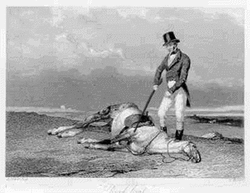
Wikipedia is sometimes held up as a great victory for crowdsourcing, although as Jaron Lanier has wryly observed, it would have been strange indeed to have predicted in the 1980's that the digital revolution was coming, and that the crowning achievement would be a copy of something that already existed--the encyclopedia.
That's a bit too cynical in my view, but more important, it leapfrogs an important question: is Wikipedia a good encyclopedia?
For matters related to education, my tentative answer is "no." For some time now I've noticed that articles in Wikipedia got things wrong, even allowing for the fact that some topics in education are controversial.
So in a not-at-all scientific test, I looked up a few topics that came to mind.
Reading education in the United States: The third paragraph reads:
There is some debate as to whether print recognition requires the ability to perceive printed text and translate it into spoken language, or rather to translate printed text directly into meaningful symbolic models and relationships. The existence of speed reading, and its typically high comprehension rate would suggest that the translation into verbal form as an intermediate to understanding is not a prerequisite for effective reading comprehension. This aspect of reading is the crux of much of the reading debate.
Next I looked at mathematics education. The section of most interest is "research" and it's a grab-bag of assertions, most or all of which seem to be taken from the website of the National Council of Teachers of Mathematics. As such, the list is incomplete: no mention of the huge literatures on (1) math facts (e.g. Orrantia et al 2010), nor of (2) spatial representations in mathematics: Newcombe, 2010. The conclusions are also, at times, sketchily draw ("the importance of conceptual understanding:" well, sure), and on occasion, controversial ("the usefulness of homework:" a lot depends on the details.)

Finally, I looked at the entry on constructivism (learning theory). This was a pretty stringent test, I'll admit, because it's a difficult topic.
The first section lists constructivists and this list includes Herb Simon, which can only be called bizarre, given that he co-authored criticisms of constructivism (Anderson, Reder & Simon, 1997).
The rest of the article is a bit of a mish-mash. It differentiates social constructivism (that learning is inherently social) from cognitive constructivism (that learners make meaning) only late in the article, though most authors consider the distinction basic. It mentions situated learning in passing, and fails to identify it as a influential third strain in constructivist thought. A couple of sections on peripheral topics have been added ("Role Category Questionnaire," "Person-centered messages") it would appear by enthusiasts.
Of the four passages I examined I wouldn't give better than a C- to any of them. They are, to varying degrees, disorganized, incomplete, and inaccurate.
Others have been interested in the reliability of Wikipedia, so much so that there is a Wikipedia entry devoted to the topic. Two positive results are worthy of note. First, site vandalism is usually quickly repaired. (e.g., in the history of the entry for psychologist William K. Estes one finds that someone wrote "William Estes is a martian that goes around the worl eating pizza his best freind is gondi.") The speedy repair of vandalism is testimony to the facts that most people want Wikipedia to succeed, and that the website makes it easy to make small changes.
Second, Wikipedia articles seem to fare well for accuracy compared to traditional edited encyclopedias. Here's where education may differ from other topics. The studies that I have seen compared articles on pretty arcane topics--the sort of thing that no one has an opinion on other than a handful of experts. Who is going to edit the entry on Photorefractice Keratectomy? But lots of people have opinions about the teaching of reading--and there are lots of bogus "sources" they can cite, a fact I emphasized to the point of reader exhaustion in my most recent book.
Now I only looked through four entries. Perhaps others are better. If you think so, let me know. But for the time being I'll be warning students in my Spring Educational Psychology course not to trust Wikipedia as a source.
References
Anderson, J. R., Reder, L. M., & Simon, H. A. (2000). Applications and Misapplications of Cognitive Psychology to Mathematics Instruction. Texas Education Review, 1(2), 29-49.
McCutchen, D., & Perfetti, C. A. (1982). The visual tongue-twister effect: Phonological activation in silent reading. Journal of Verbal Learning and Verbal Behavior, 21, 672-687.
Newcombe, N. S. (2010). Picture This. American Educator, 1, 29.
Orrantia, J., Rodríguez, L., & Vicente, S. (2010). Automatic activation of addition facts in arithmetic word problems. The Quarterly Journal of Experimental Psychology, 63(2), 310-319.
Radach, R. (2004). Eye movements and information processing during reading (Vol. 16, No. 1-2). Psychology Press.
Riener, C., & Willingham, D. (2010). The myth of learning styles. Change: The Magazine of Higher Learning, 42(5), 32-35.
 RSS Feed
RSS Feed